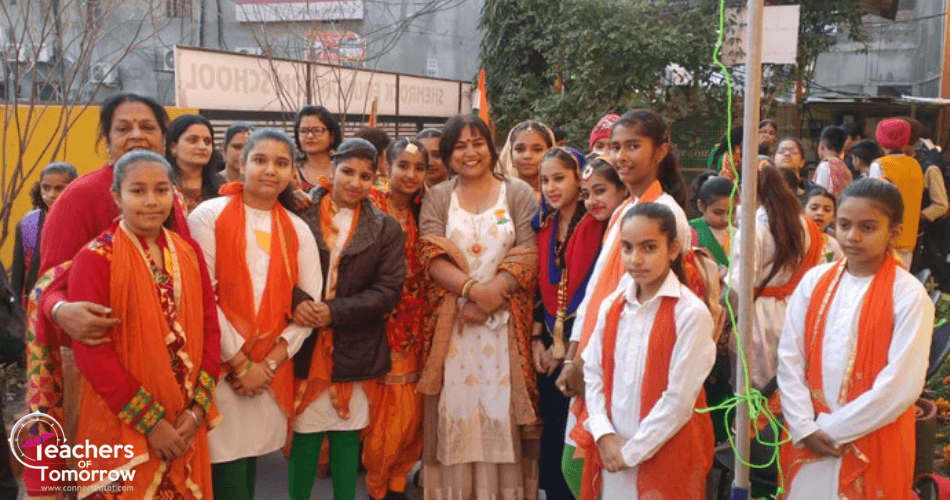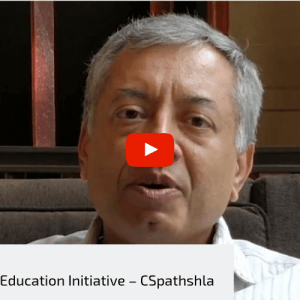
This quarter Teachers of Tomorrow turns its spotlight onto Chetan Bansal. She is both the director and principal at Shemrock Foundation School, Zirakpur. One of the teachers told us about her ‘Creativity Festival for Teachers’ which brought out some interesting revelations for the teachers and students alike.
Read below to learn more about Chetan, her perspective about the future of education, along with her ability to connect with students and make a difference in their lives.
Briefly, share your teaching experience with us and what made you choose the profession of teaching?
I have been teaching for the last 30 years. As a child, I always loved to explain answers to my classmates. It’s a great profession and I learn something new every day. I started teaching at the age of 16 as a nursery teacher and till today, I feel excited about the new concepts of changing times.
Describe your teaching style and how you accommodate varying learning styles of different students in your classes?
My teaching style is about involving everyone in teaching and inculcating curiosity in young minds. I always try to be mysterious with my students. Students always wait for me anxiously, because they know something unique is going to happen in the class.
It is very important to design lessons for different types of learners. I try to involve kinesthetic learners in the class as my assistants for different activities, explain the rules of the activity or game in the class and assign the duty to auditory learners to explain to different groups. Visual learners explain diagrams and make diagrams for me on the board or on different sheets.
How would you describe your style of leadership?
I am a democratic leader and always include staff members in decision making. Before assigning any task, I clearly explain the idea behind the activity. We conduct lessons to explain new teaching methods, allowing them to experiment with these to see whether it is beneficial for the students. Am always accessible to my team and students, and they feel free to discuss problems with, but always with a set of solutions.
Being a leader how do you motivate and encourage teachers to get them excited about their work when the burden of responsibility often appears overwhelming? Please give an example if possible.
I design my staff meetings and workshops in such a way that after attending the first meeting, my team waits for the next session. An important feature of my workshops is that I always include self- help or self-improvement tips. I try to find exciting things for teachers to know and explore.
Can you tell us about the new programme you introduced in your school to bring out the creativity in teachers?
We organized a ‘Creativity Festival for Teachers’ at school.
I explained to my teachers that we never forget driving, swimming, and cycling because our body has more capacity to learn when combined with the brain’s learning process. Hence, I told them to design a lesson with the traditional methods of using multimedia and conducting an assessment.
After the assessment, they would have to record the performance of the students. Then they would have to design a lesson without any technology or books, and design teaching aids and a game to explain the concept, and conduct the assessment. Teachers had to present the documentary proof.
Results were amazing!
Over the time, we went through the whole process to see the difference. A surprising, yet important fact which came to light was that everything is available on Google to support your idea, but it is very important to have an idea before going to Google. Thinking and penning down the ideas brought out creativity of teachers.
This was the actual achievement. Now teachers are explaining to their students that they should first create an idea and then go to Google to get the required research.
According to you, what are the key changes that our education system needs? Any specific curriculum?
Not only does our education system need a transformation, but even the mindset of parents has to be changed.
If parents measure the school’s standards by books and writing in their children’s copies, then we cannot help. Therefore, more parental awareness or involvement is needed.
Our curriculum too needs improvement. For example, when we teach students the use of plants, we never mention in our books that plants are a source of joy too. Our curriculum should be related to practical life. Children should use mathematical and scientific concepts in real life. In a nutshell, education should not be confined to the four walls of the classroom.
Any words of advice for other teachers of our community, Teachers of Tomorrow.
The future is uncertain and artificial intelligence is taking over.
We need to prepare our children for a very advanced level of technology where jobs are fast disappearing.
Therefore, we have to concentrate on life skills. We should inculcate curiosity and a sense of awareness among children. Our students should be able to accept any challenge thrown at them.
Teachers are still the most trusted community on earth and have a responsibility on their shoulders. They should be passionate about their subjects and dedicated to their profession. A child who is about to experience this world needs a companion and guide, and a teacher can become all of that.
Check out our other teachers in the spotlight here- https://connectedtot.com/category/teacher-spotlight/




